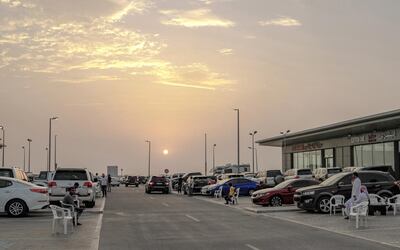In 2013, I wrote a column expressing my concern for the long-term prospects of the Abu Dhabi neighbourhood I live in, which is the section of Al Mushrif colloquially known as the Churches Area or Immigration.
The block is home to three schools, the busy churches compound, which was visited earlier this year by Pope Francis, the residential visa office, as well as Umm Al Emarat Park, which at the time was undergoing extensive refurbishment works. It would reopen in 2015.
I fretted six years ago because at the time it felt like the neighbourhood was under pressure from multiple forces.
New citywide regulations required grocery shops to modernise their premises and be formally licensed following the introduction of the Baqala system, with the consequence that some stores closed down and residents worried they would never reopen.
We thought the new normal would be driving to the local petrol station to buy daily essentials rather than being able to walk to a neighbourhood store. Familiar routines were being upended by change.
The so-called car souq – a grand name for the areas of residential parking in front of the block's apartment buildings that had been occupied by second-hand car dealers to sell their stock from – had also just been cleared out of the neighbourhood and relocated to the purpose-built Motor World near the airport.

The Mawaqif paid parking system was being gradually rolled out across the city at the same time. Eventually that would lead to the entire island becoming a paid parking environment. Residents wondered how much that would add to their cost of living but it was the removal of the car souq that was most concerning locally.
When the car souq was still there, the inconvenience of never being able to find a parking space seemed to be outweighed by the micro-economy of shops, offices and stores that the car dealers helped support.
For car enthusiasts, the block was also a charming treasure trove of used "no accident damage" saloon cars and "never driven in the desert" SUVs jostling for space with more exotic diamonds in the dust, such as a rare Panther Lima and even a single pearl white-coloured example of the Lebanese-Australian wonder that is the Bufori La Joya. It had been a car shopper's paradise and a thriving commercial district before it was displaced.
The dealers hadn't wanted to leave town. They liked the location of the old souq and believed that their new site was too remote and too expensive. Residents didn't want them to go either. Many thought the neighbourhood might wither on the vine without them.
Six years later it is worth considering how both the old neighbourhood and the new Motor World have fared.
Our weekend columnist Saeed Saeed recently painted a contemporary picture of Motor World. He described it as a haven for sales and wisdom and as an "Abu Dhabi institution". It's clear that for all the teething problems that were evident when it opened, the facility is now a bustling hub of car dealers and customers.
It’s a similar story in the neighbourhood they left behind.
The car dealers have been replaced by rows of affordable restaurants. Where once residents feared life would be sucked out of the neighbourhood, now there are no such concerns.
The relatively recent arrival of The One furniture showroom from Khalidiyah to the edge of the block and even the opening of a branch of DHL, a bookend to counterbalance its rival delivery company Aramex at the other end of the district, point to a neighbourhood in good health.
Housing stock is also being slowly refurbished and an interesting citywide byproduct of the 2016 introduction of the municipality fee has been to check some of the more inflationary impulses of landlords seeking to maximise their profits.
Convenience stores have returned under the Baqala system, which has helped improve the shopping experience for customers and raise standards among retailers. Few could argue with the positive impact the licensing system has made. The Mawaqif permit system has addressed many, if not all, of the parking issues that used to present themselves.
In other words, the worst didn’t happen. Sometimes we worry that the march of progress will only bring misery and sometimes it transpires that our fears are grossly misplaced.
But there is also something important to say about the process of urban progress. Residents may have feared the introduction of the Baqala and Mawaqif systems but both developments have changed our lives for the better in ways we couldn’t imagine at the time.
It's worth reflecting on that last point when considering the introduction of road tolls in Abu Dhabi next year. While many will be concerned with the cost, even with the charging caps announced this week, we will, I suspect, look back on January 1, 2020 as an important step forward for the city in addressing congestion issues and promoting the use of public transport. I certainly hope so.
Nick March is an assistant editor-in-chief for The National


